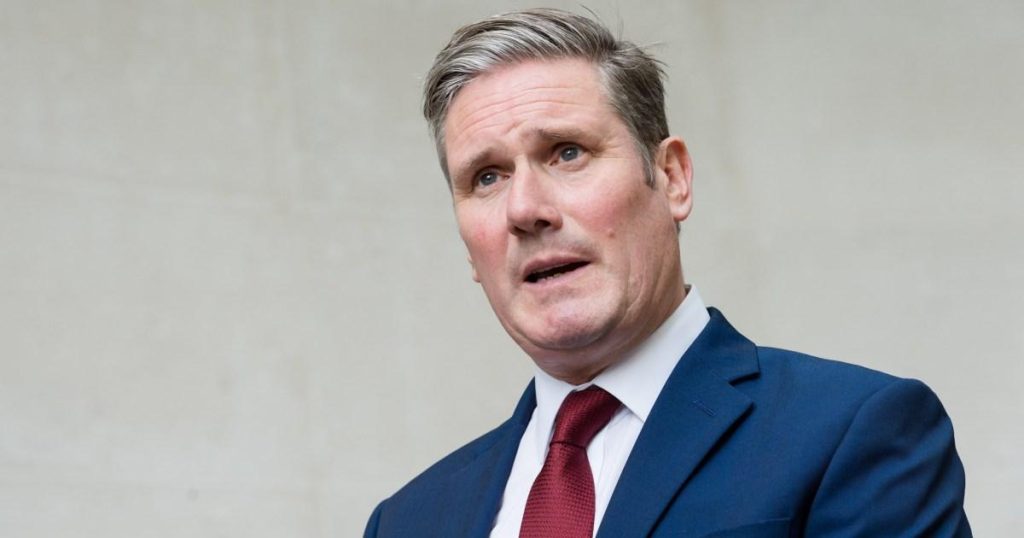Keir Starmer’s Vocal Coaching Session During Lockdown Sparks Controversy
Sir Keir Starmer, the leader of the Labour Party, has found himself embroiled in a controversy surrounding a vocal coaching session he undertook during the Christmas lockdown period in 2020. The session, led by actor and vocal coach Leonie Mellinger, was held at Labour headquarters in preparation for a significant press conference on Brexit. While Ms. Mellinger held key worker status and adhered to mask-wearing protocols during the session, questions have arisen regarding the legitimacy of her travel from Brighton, which was under Tier 3 restrictions at the time, to London, which was under the more stringent Tier 4 lockdown.
The issue came to light following the serialization of the upcoming book, "Get In," in The Times, which first reported Starmer’s engagement of Ms. Mellinger’s services. The Sun subsequently reported on the potential breach of lockdown regulations, prompting Conservative MP Richard Holden to write to the Prime Minister, accusing Starmer of a "casual disregard for the law" during a period of significant sacrifice for the public. Holden’s letter amplified the accusations, placing Starmer under increased scrutiny.
Starmer, during a press conference in Brussels, categorically denied breaching any lockdown rules. His response, however, was brief and delivered as he departed the podium, addressing reporters who were not part of the pre-approved list for questioning. This seemingly dismissive manner of addressing the allegations has further fueled the controversy, raising concerns about transparency and accountability.
Downing Street has refrained from engaging with the allegations, stating that the Prime Minister remains focused on governmental priorities. This detached stance, while perhaps politically astute, leaves the questions surrounding Starmer’s actions unanswered. A Downing Street spokesperson explicitly declined to address the matter, emphasizing the government’s focus on its own agenda and the priorities of the people.
While government officials have largely avoided commenting directly on the allegations, some have offered cautious defenses. Catherine McKinnell, Minister for School Standards, stated that, to her knowledge, no COVID rules were broken. She pointed to the essential nature of Starmer’s role and the importance of the upcoming Brexit press conference, suggesting that the vocal coaching session was justified as part of his official duties. This argument hinges on the interpretation of lockdown regulations and the definition of essential work, leaving room for debate.
This incident follows previous scrutiny of Starmer’s conduct during lockdown. He and his deputy, Angela Rayner, were cleared of wrongdoing after their attendance at an event in a Durham MP’s office in April 2021. The resurgence of these questions about Starmer’s adherence to lockdown rules creates a narrative of potential hypocrisy, especially given his party’s criticism of the government’s handling of similar situations. The timing of these allegations, in the lead-up to the next general election, adds a further layer of political complexity.
The ongoing controversy raises several key questions. Was Ms. Mellinger’s travel to London genuinely essential, given the strict lockdown restrictions in place? Did Starmer exercise appropriate judgment in engaging her services during this period? And, perhaps most importantly, how will this incident impact public perception of his leadership and integrity? The answers to these questions could significantly influence the political landscape in the coming months.
The episode has also sparked a broader discussion about the complexities and ambiguities of lockdown regulations. While the rules were designed to protect public health, their implementation was often challenging and subject to varying interpretations. This case highlights the difficulties in determining what constituted essential work and the permissibility of travel under specific circumstances. The lack of clear-cut guidelines contributed to confusion and potentially inconsistent application of the rules.
Furthermore, the controversy surrounding Starmer’s vocal coaching session raises questions about the role and responsibilities of public figures during times of national crisis. The public expects their leaders to adhere to the same rules they impose on the general population. Any perceived deviation from these rules can erode trust and damage public confidence. This incident serves as a reminder of the high standards of conduct expected from those in positions of power.
The political fallout from this controversy remains to be seen. While Starmer has denied any wrongdoing, the allegations could still damage his reputation and standing with the public. The Conservative Party is likely to seize upon this incident to attack Starmer and portray him as hypocritical. How Starmer and the Labour Party respond to these attacks will be crucial in mitigating any potential political damage.
The media coverage of this incident has also come under scrutiny. Some argue that the focus on Starmer’s vocal coaching session distracts from more important issues facing the country. Others suggest that the media has a responsibility to hold public figures accountable for their actions, regardless of their political affiliation. The ongoing debate highlights the complex and often-conflicting roles of the media in shaping public opinion and holding power to account.
In conclusion, the controversy surrounding Keir Starmer’s vocal coaching session during lockdown raises a number of significant questions about adherence to regulations, the responsibilities of public figures, and the role of the media. The incident has the potential to impact public perception of Starmer’s leadership and influence the political landscape in the lead-up to the next general election. The ongoing debate underscores the importance of transparency, accountability, and ethical conduct for those in positions of power.


